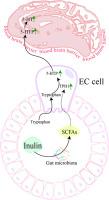益生菌菊粉通过调节肠道微生物群和 5-HT 代谢,缓解酒精戒断小鼠的焦虑和抑郁样行为。
IF 6.7
1区 医学
Q1 CHEMISTRY, MEDICINAL
引用次数: 0
摘要
背景介绍酒精依赖症(AD)是一种常见的精神疾病,通常伴有焦虑和抑郁。这些并发症与血清素(5-HT)代谢紊乱和肠道微生物菌群失调有关。临床研究表明,菊粉(一种益生元)可通过影响肠道微生物群来缓解 AD 患者的焦虑和抑郁,但其机制仍不清楚。目的:本研究旨在探讨菊粉(一种益生元)改善 AD 戒断小鼠焦虑和抑郁样行为的潜在机制。这项研究基于药物与食物同源性和肠道治疗脑病,目的是为AD治疗开发新的临床策略:为此,研究人员分析了AD患者的粪便样本,以确定与AD相关的微生物。以菊粉作为干预措施,以马来酸氟伏沙明作为对照,建立了AD戒断小鼠模型。16S微生物组测序和UPLC-TQMS靶向代谢组学等技术被用来评估肠道微生物群、短链脂肪酸(SCFAs)水平和5-羟色胺代谢:采用 "黑暗中饮酒 "方案建立 AD 戒断模型,为期 6 周。菊粉(2 克/千克/天)和马来酸氟伏沙明(30 毫克/千克/天)给药 4 周。采用开阔地试验、强迫游泳试验和悬尾试验来评估小鼠的焦虑和抑郁样行为。ELISA和qRT-PCR评估了结肠、血液和前额叶皮层中的5-羟色胺代谢,16S微生物组测序分析了肠道微生物群的变化,UPLC-TQMS检测了SCFAs水平。免疫组化技术用于研究肠道屏障的完整性:结果:AD 患者体内产生 SCFA 的细菌(如粪杆菌和 Roseburia)减少。在小鼠中,AD戒断导致焦虑和抑郁样行为、5-羟色胺代谢紊乱和肠道微生物群失调。补充菊粉可减轻这些行为,提高5-羟色胺和5-羟色氨酸(5-HTP)的水平,上调结肠色氨酸羟化酶1(TPH1)的表达,促进有益菌(如粪杆菌和蔷薇菌)的生长,同时提高SCFAs的水平:结论:菊粉能增加粪杆菌和罗斯堡菌的数量,促进 SCFAs 的产生,并调节 5-HT 代谢,从而改善 AD 戒断小鼠的焦虑和抑郁样行为。这些研究结果表明,菊粉可通过靶向微生物组-肠-脑轴,作为一种营养干预措施,促进 AD 患者的心理健康。本文章由计算机程序翻译,如有差异,请以英文原文为准。

Prebiotic inulin alleviates anxiety and depression-like behavior in alcohol withdrawal mice by modulating the gut microbiota and 5-HT metabolism
Background
Alcohol dependence (AD) is a common psychiatric disorder, often accompanied by anxiety and depression. These comorbidities are linked to disturbances in serotonin (5-HT) metabolism and gut microbiota dysbiosis. Clinical studies suggest that inulin, a prebiotic, can alleviate anxiety and depression in AD patients by affecting the gut microbiota, although the mechanisms remain unclear.
Purpose
The purpose of this study is to investigate the potential mechanisms by which inulin, a prebiotic, improves anxiety and depression-like behaviors in AD withdrawal mice. This research is based on the drug and food homology and intestinal treatment of encephalopathy, with the goal of developing new clinical strategies for AD treatment.
Study Design
For this purpose, fecal samples from AD patients were analyzed to identify microorganisms associated with AD. An AD withdrawal mouse model was created, with inulin as the intervention and fluvoxamine maleate as the control. Techniques such as 16S microbiome sequencing and UPLC-TQMS-targeted metabolomics were used to assess gut microbiota, short-chain fatty acids (SCFAs) levels, and 5-HT metabolism.
Methods
The AD withdrawal model was built using the "Drinking-in-the-dark" protocol over 6 weeks. Inulin (2 g/kg/day) and fluvoxamine maleate (30 mg/kg/day) were administered for 4 weeks. The open field test, forced swim test, and tail suspension test were used to evaluate anxiety and depression-like behaviors in mice. ELISA and qRT-PCR assessed 5-HT metabolism in the colon, blood, and prefrontal cortex, while 16S microbiome sequencing analyzed changes in gut microbiota and UPLC-TQMS examined SCFAs levels. Immunohistochemistry was used to study intestinal barrier integrity.
Results
AD patients showed reduced SCFA-producing bacteria such as Faecalibacterium and Roseburia. In mice, AD withdrawal led to anxiety and depression-like behaviors, disrupted 5-HT metabolism, and gut microbiota dysbiosis. Inulin supplementation alleviated these behaviors, increased 5-HT and 5-hydroxytryptophan (5-HTP) levels, upregulated colonic tryptophan hydroxylase 1 (TPH1) expression, and promoted the growth of beneficial bacteria such as Faecalibacterium and Roseburia, while also increasing SCFAs levels.
Conclusion
Inulin increases the abundance of Faecalibacterium and Roseburia, enhances SCFAs production, and regulates 5-HT metabolism, improving anxiety and depression-like behaviors in AD withdrawal mice. These findings suggest that inulin may serve as a nutritional intervention for mental health in AD patients by targeting the microbiome-gut-brain axis.
求助全文
通过发布文献求助,成功后即可免费获取论文全文。
去求助
来源期刊

Phytomedicine
医学-药学
CiteScore
10.30
自引率
5.10%
发文量
670
审稿时长
91 days
期刊介绍:
Phytomedicine is a therapy-oriented journal that publishes innovative studies on the efficacy, safety, quality, and mechanisms of action of specified plant extracts, phytopharmaceuticals, and their isolated constituents. This includes clinical, pharmacological, pharmacokinetic, and toxicological studies of herbal medicinal products, preparations, and purified compounds with defined and consistent quality, ensuring reproducible pharmacological activity. Founded in 1994, Phytomedicine aims to focus and stimulate research in this field and establish internationally accepted scientific standards for pharmacological studies, proof of clinical efficacy, and safety of phytomedicines.
 求助内容:
求助内容: 应助结果提醒方式:
应助结果提醒方式:


